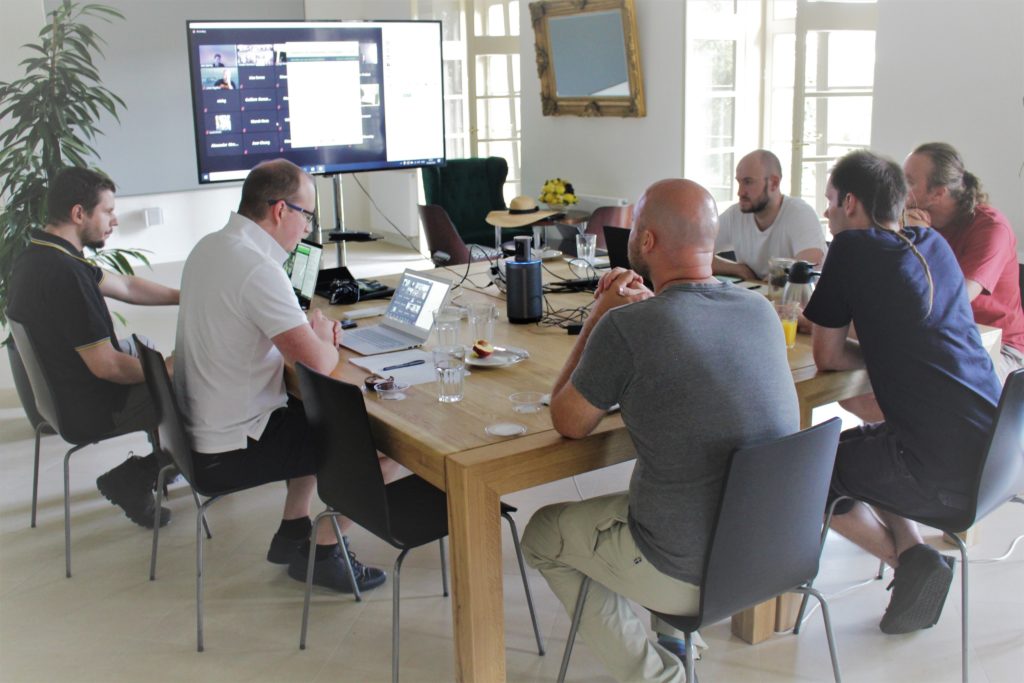We ran the first Meta-Learning & Multi-Agent Learning Workshops (MLMA) in 2020 to bring together world-renowned experts in order to advance the field of meta-learning and multi-agent learning. it was held in a hybrid form at GoodAI headquarters in Prague and online. Below you can find info about the workshop and watch the videos.

The GoodAI team taking part in the Meta-learning & Multi-agent Learning Workshop
The MLMA 2020 workshop aimed to answer some critical questions:
- Can we build a general AI agent that is composed of many (homogenous) units that were meta-learned to communicate in order for the agent to learn new tasks in a continuous and open-ended manner?
- Can these units be meta-learned to communicate learned credit, form new topologies, modulate other units, grow new units, learn new motivations, and more?
- Can it lead to an agent that adapts its internal structures in order to better adapt to future challenges?
The workshop took an interdisciplinary approach drawing on the fields of; machine learning, meta-learning, artificial life, network science, dynamical systems, complexity science, collective computation, social intelligence, creativity and communication, and more. The idea for this workshop came from the type of questions we’re solving while working on our Badger Architecture.
Core areas of focus
- Can we frame policy search as a multi-agent learning problem? (Learn how can units coordinate to learn new tasks together.)
- Can we frame it as a meta-learning problem?
- Can we frame it as just another Deep Learning architecture, e.g. RNN with shared weights?
- Minimum Viable Environment = what minimalistic environment will support learning a general learning algorithm that can generalize to more complex environments interesting for humans?
- How can we add intrinsic motivation, so the agent drives itself, without explicit goals, towards open-ended development?
Full list of speakers and talks
- Jan Feyereisl and Marek Rosa (GoodAI). Meta-Learning and Multi-Agent Learning Workshop and Badger Introduction.
- Ettore Randazzo and Alexander Mordvintsev (Google Research). End to end differentiable Self organising systems
- Junhyuk Oh (DeepMind). Discovering Reinforcement Learning Algorithms
- Deepak Pathak (CMU). Intelligence Without a Brain
- Anuj Mahajan (University of Oxford). A multi-agent perspective to AI
- Jun Wang (UCL). Multi-Agent Learning
- Angeliki Lazaridou (DeepMind). Learned Communication
- Jakob Foerster (The Vector Institute). Self-Play and Zero-Shot Human AI Coordination in Hanabi
- Wendelin Boehmer (TU DELFT). Relative Overgeneralization in Distributed Control
- Ferran Alet (MIT CSAIL). Modular Meta-Learning: Learning to build up knowledge through modularity
- Clemens Rosenbaum (ASAPP Inc). Modular & Compositional Computation
- Melanie Mitchell (The Santa Fe Institute). Complexity: Concepts, Abstraction, and Analogy in Natural and Artificial Intelligence
- Tomas Mikolov, (CTU). Measuring growth of complexity
- Nicholas Guttenberg (GoodAI & Cross Compass). Why Think?
- Julian Togelius (New York University). AI Learning Environments and PCG and Open-endedness and…the Extended Mind?
- Kenneth Stanley (OpenAI). The Importance of Open-Endedness in AI and Machine Learning
- Stanislav Fort (Stanford). Towards the Science of Deep Learning – The Loss Landscape Geometry
- Luke Metz (Google Brain). Learned Learning Algorithms
- Jonathan Frankle (MIT). Understanding Neural Networks via Pruning
